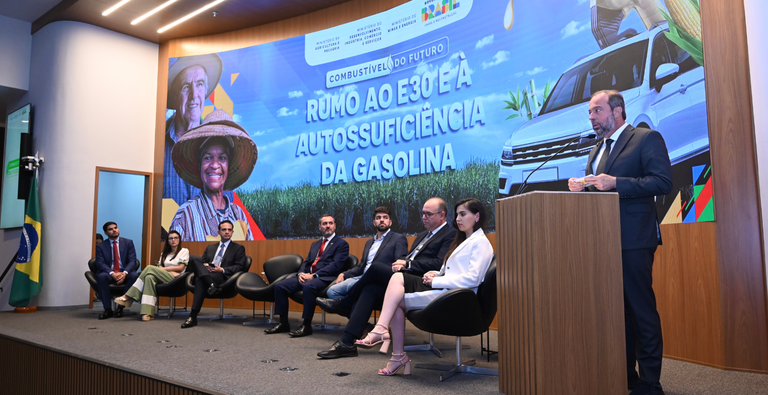Notícias
E30
Silveira: E30 to lower gasoline prices, free Brazil from importation

With the expansion of ethanol blends, Silveira explained, it is estimated that a reduction of up to BRL 0.13 (thirteen cents) per liter of gasoline is possible, an effect that will also help to control inflation - Credit: Ricardo Botelho/MME
Brazil’s Minister of Mines and Energy, Alexandre Silveira, announced on Monday (March 17) that adopting E30 — a fuel blend containing 30% anhydrous ethanol and 70% gasoline — could lower fuel prices at gas stations and eliminate Brazil’s need to import gasoline. The announcement came during a presentation by the Mauá Institute of Technology (Instituto Mauá de Tecnologia/IMT), which showcased test results confirming the new fuel’s technical viability.
With the increase in ethanol content, gasoline prices are estimated to drop by up to BRL 0.13 (thirteen cents) per liter, an impact that will also help control inflation. “We are taking another step toward making the Fuel of the Future law a reality today. E30 not only reduces costs for consumers but also strengthens Brazil’s energy security,” Silveira stated.
The transition from E27 to E30 will eliminate the need to import 760 million liters of gasoline annually, boosting national biofuel production. According to the minister, this shift will increase ethanol demand by 1.5 billion liters and generate an estimated BRL 9 billion in sector investments. “E30 is safe for both our two- and four-wheeled fleets. With its implementation, Brazil will no longer be at the mercy of the international market and external price volatility. Gasoline prices will be driven by domestic competitiveness, not import parity,” he emphasized.
FUEL OF THE FUTURE - Tests with E30 represents yet another advancement in the implementation of the Fuel of the Future law (Lei do Combustível do Futuro, No. 14,993/24), which established guidelines for the decarbonization and modernization of the Brazilian energy matrix. Legislation allows increasing the limit of ethanol levels in gasoline up to 35%, as long as technical viability is proved, reinforcing the country’s commitment to energy security and sustainability.
The adoption of the new blend can reduce greenhouse gas emissions by 1.7 million tons annually, the equivalent of removing 720,000 vehicle from the streets each year. The tests conducted by IMT were monitored by organizations from the automotive sector, such as ANFAVEA, SINDIPEÇAS, ABRACICLO, and ABEIFA. With confirmation of technical viability, the proposal to increase the blend to 30% will be sent to the National Energy Policy Council (Conselho Nacional de Política Energética/CNPE) before the end of the year.